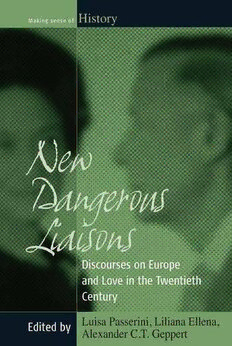
New Dangerous Liaisons: Discourses on Europe and Love in the Twentieth Century (Making Sense of History) PDF
334 Pages·2010·1.574 MB·English
Most books are stored in the elastic cloud where traffic is expensive. For this reason, we have a limit on daily download.
Preview New Dangerous Liaisons: Discourses on Europe and Love in the Twentieth Century (Making Sense of History)
Description:
In Europe, love has been given a prominent place in European self-representations from the Enlightenment onwards. The category of love, stemming from private and personal spheres, was given a public function and used to distinguish European civilisation from others. Contributors to this volume trace historical links and analyse specific connections between the two discourses on love and Europe over the course of the twentieth century, exploring the distinctions made between the public and private, the political and personal. In doing so, this volume develops an innovative historiography that includes such resources as autobiographies, love letters, and cinematic representations, and takes issue with the exclusivity of Eurocentrism. Its contributors put forth hypotheses about the historical pre-eminence of emotions and consider this history as a basis for a non-Eurocentric understanding of new possible European identities.
See more
The list of books you might like
Most books are stored in the elastic cloud where traffic is expensive. For this reason, we have a limit on daily download.
